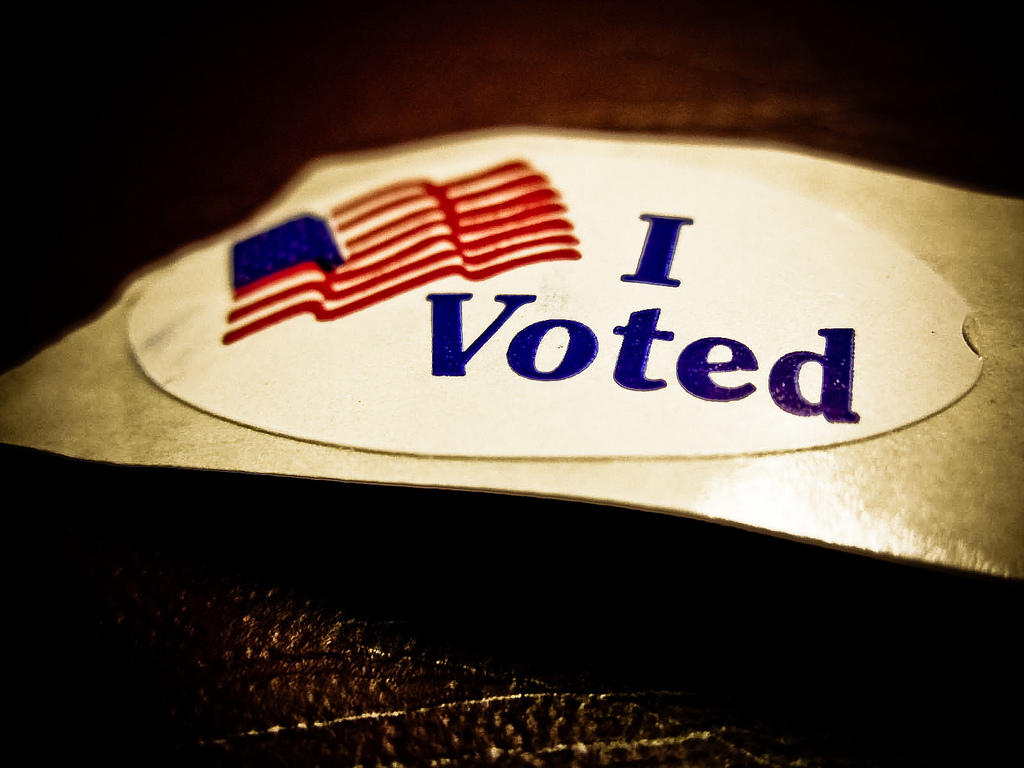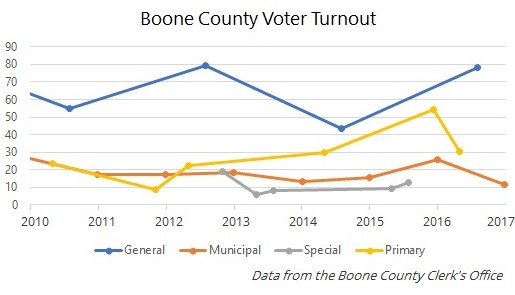Going from Voter Burnout to Voter Turnout

In Boone County, voter turnout among registered voters tops out at just under 80 percent for most general elections, and it’s at its highest in presidential years. That’s a good number, and it shouldn’t be too surprising, given that the November election cycle consumes every facet of social and news media.
But that high rate of participation drops off dramatically for every other type of election. Even primary elections in presidential years fall well below general election turnout — our August 2016 election, for example, which included primary contests and several local propositions, drew out only 30 percent of registered voters.
Most concerning, though, is the lack of participation in our local elections.

Low municipal turnout means that just a small number of Boone County residents choose our local representatives. Only 11 percent of registered voters made the trek to the polls for last April’s election. That’s 13,224 voters. Thirteen thousand people chose two members of the five-person Boone Hospital Board of Trustees, who are tasked with evaluating the future of the hospital’s lease, which currently infuses $2.3 million into Boone County health and social services each year. They also chose three of the seven members of the Columbia Public Schools Board of Education, which makes decisions on everything from where to build schools to whether to increase teacher pay. Local policy bodies like these obviously have a direct impact on everyday life, but decades of research and campaign strategies have yet to yield better municipal voter turnout.
If we want to get more people involved, some changes could be made to the elections process. First, combining election dates would go a long way to reducing voter fatigue. Having talked to a fair share of voters during recent election seasons, the No. 1 reason I heard for not voting is that we go to the polls too often. Voters can’t keep up. Boone County voters have the opportunity to cast a ballot no less than three times a year during even-numbered years, not including special elections or the March presidential preference primary. Investing the time and energy it takes to be adequately informed about every issue on every ballot is understandably difficult and, for some, truly prohibitive. Consolidating the election schedule not only encourages turnout, but it can also save taxpayer money by decreasing the administration costs of extra elections.
There’s another pretty big change we can make to increase voter turnout —celebrating Election Day as the social event it once was. Early in American history, voters (white, wealthy men, admittedly) enjoyed food, barbeques, and even a special election cake as they cast their ballots. Whole communities came together in celebration.
Election festivals have made a resurgence recently. Nonprofits and community agencies have hosted non-partisan parties to encourage voter turnout, and they’ve succeeded. Municipal election turnout in 2005 and 2006 ticked up by at least 2.6 percentage points in precincts where a festival occurred, and more recent festivals produced similar results, even during national elections. In some states, organizations like the YMCA have also begun offering services like free child care to help making voting easier. Making Election Day a group celebration instead of an individual burden makes voters more excited about voting. And it goes without saying that when Election Day becomes an easier and more enjoyable experience for voters, everyone wins.
On the local level, poor turnout has dire consequences — research shows that low levels of participation can lead to policies that are biased or that marginalize others in the community. In order to elect local leaders that represent everyone, it’s vital that every voice is heard on Election Day. To borrow a quote often attributed to Pericles, “Just because you do not take an interest in politics doesn’t mean politics won’t take an interest in you.”
Brianna Lennon is a former assistant attorney general and elections integrity coordinator for the State of Missouri. She practices at the Law Office of Mike Campbell and blogs about civics for CBT.


